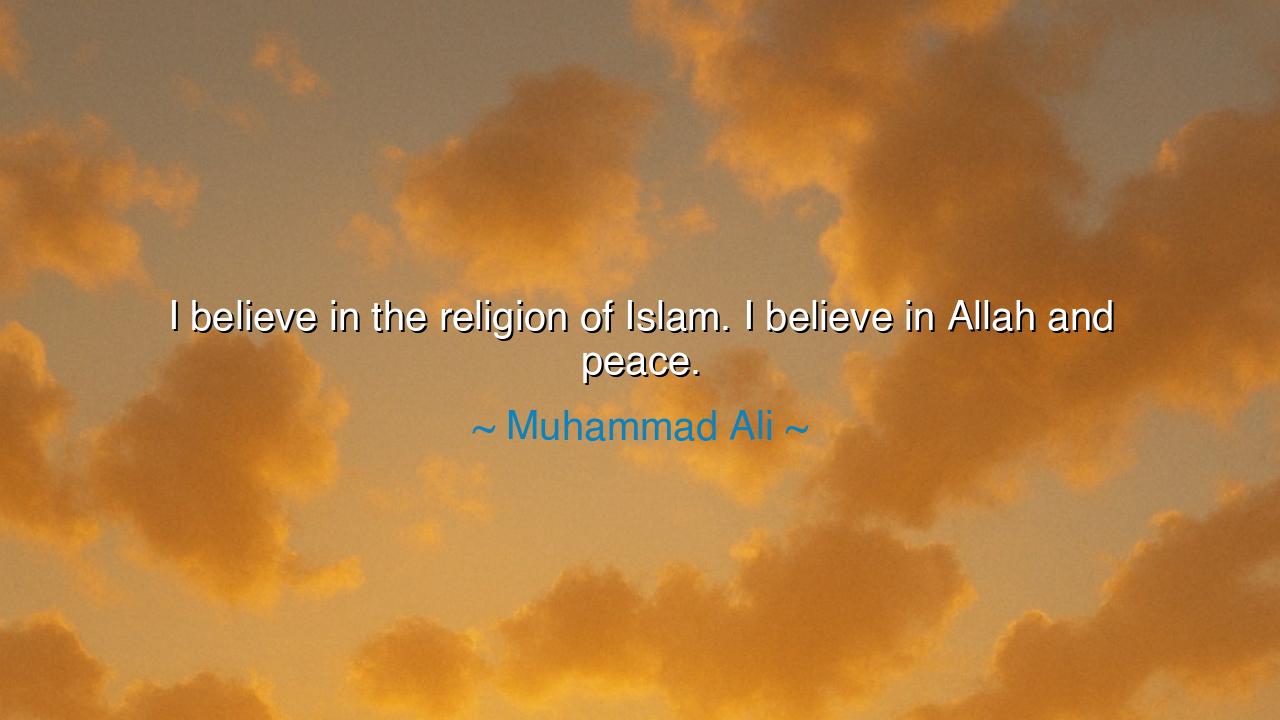
I believe in the religion of Islam. I believe in Allah and peace.






“I believe in the religion of Islam. I believe in Allah and peace,” declared Muhammad Ali, the warrior of the ring and the poet of the soul. His words, though simple, rise like a call to truth — a testament not only to faith, but to conviction, identity, and peace born of understanding. In a world often divided by creed and color, Ali’s proclamation stood as both shield and sword: a shield against ignorance, and a sword cutting through fear and prejudice. For this was not a man speaking of religion as ritual, but as way, as truth, as the living embodiment of peace in the heart of struggle.
The origin of this quote lies in the fire of transformation — in a young man who conquered the world, then sought to conquer himself. Born Cassius Clay in Louisville, he rose to fame as the world’s heavyweight champion. Yet even as he stood crowned by glory, he felt a hunger that fame could not feed. When he embraced Islam, he shed not just a name, but an illusion. In doing so, he found what the ancients called inner alignment — a union between the soul and its purpose. To say “I believe in Allah” was not mere declaration; it was a surrender to truth beyond self. And to say “I believe in peace” was a vow — to live as one who fights not out of hatred, but out of love for justice.
Islam, in its essence, means submission — not to man, but to the Divine. It is the acceptance that life, with all its triumphs and trials, flows from one Source. For Ali, this belief was no abstraction. He lived it in the roar of the crowd and the silence of prayer. When the U.S. government demanded that he fight in a war he did not believe in, he stood firm, saying, “I have no quarrel with them Viet Cong.” He lost his title, his wealth, his freedom — yet not his peace. For he who truly believes in Allah knows that honor is not granted by men, but by the truth one serves. In his refusal, he embodied the courage of prophets and poets who have stood against the tides of injustice throughout history.
Think of Mahatma Gandhi, who held no sword yet conquered an empire through peace; or Malcolm X, whose faith transformed rage into clarity, rebellion into righteousness. Both men, like Ali, understood that peace is not the absence of conflict, but the triumph of the soul over hatred. To believe in peace, as Ali did, is to fight not against people, but against ignorance — to see in the face of every enemy the reflection of one’s own humanity. His faith was not a wall but a bridge — between courage and compassion, strength and mercy, the body that fights and the heart that forgives.
Ali’s life was a sermon written in action. When he said, “I believe in Allah and peace,” he was not reciting; he was living the creed. He bowed five times a day, even in training camps, his body glistening with sweat but his spirit tranquil. He gave to the poor, spoke against oppression, and treated his fame as a trust, not a throne. For him, belief was not a word but a discipline — a daily effort to bring harmony between what he said, what he thought, and what he did. In this, he mirrored the wisdom of the ancients: that faith without action is a body without breath.
The religion of Islam that Ali embraced was not the caricature painted by fear, but the living spirit of compassion, discipline, and unity. He believed that peace was not merely the goal of faith, but its proof. True belief in Allah does not divide humanity; it deepens one’s love for all creation. To live in submission to God is to live free from ego, to speak truth without cruelty, to act with strength without arrogance. This was Ali’s path — the path of the warrior-saint, the athlete who fought with his fists and healed with his faith.
So, dear listener, what lesson shall you take from this? It is this: belief must be more than words. To say “I believe” is to live with integrity when the world tempts you to bend. To say “I believe in peace” is to answer anger with patience, injustice with courage, hatred with understanding. You may not fight in a ring, nor stand before nations, but your life, too, can be an arena where the heart’s strength is tested.
And remember, as Ali taught with his life and his words: to believe in Allah is to trust that every hardship carries a lesson, every loss conceals a gift. To believe in peace is to become the stillness amid the storm. For those who walk the path of faith with open eyes and fearless hearts, there is no defeat — only the eternal victory of the soul aligned with truth. Like Muhammad Ali, let your creed not only be spoken, but lived — with courage, compassion, and unshakable peace.






AAdministratorAdministrator
Welcome, honored guests. Please leave a comment, we will respond soon